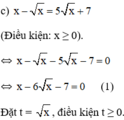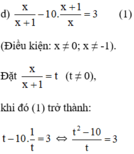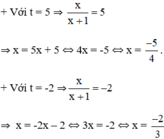Tìm x,biết:
a)4x-(3+5x)=14
b)x2-4x=0
c)(x-3)2=4/25
Hãy nhập câu hỏi của bạn vào đây, nếu là tài khoản VIP, bạn sẽ được ưu tiên trả lời.


a) \(\left(x-4\right)^2-\left(x-4\right)=0\)
\(\left(x-4\right)\left(x-4-1\right)=0\)
\(\left[{}\begin{matrix}x-4=0\\x-5=0\end{matrix}\right.\)
\(\left[{}\begin{matrix}x=4\\x=5\end{matrix}\right.\)
b) \(5x^2\left(x-7\right)+7\left(x-7\right)=0\)
\(\left(x-7\right)\left(5x^2+7\right)=0\)
\(\left[{}\begin{matrix}x-7=0\\5x^2+7=0\end{matrix}\right.\)
\(\left[{}\begin{matrix}x=7\\x^2=\dfrac{-7}{5}\end{matrix}\right.\)
\(x=7\)
c) \(x^2\left(x-3\right)-\left(x-3\right)=0\)
\(\left(x-3\right)\left(x^2-1\right)=0\)
\(\left[{}\begin{matrix}x=3\\x=\pm1\end{matrix}\right.\)
a) (x - 4)^2=(x - 4)
(x - 4) (x -4)=(x -4 )
(x - 4) (x - 4)-(x - 4)=0
(x-4) (x-4-1)=0
(x-4) (x-5)=0
TH1:x-4=0 TH2:x-5=0
x=4 x=5

e: ta có: \(4x^2+4x-6=2\)
\(\Leftrightarrow4x^2+4x-8=0\)
\(\Leftrightarrow\left(x+2\right)\left(x-1\right)=0\)
\(\Leftrightarrow\left[{}\begin{matrix}x=-2\\x=1\end{matrix}\right.\)
f: Ta có: \(2x^2+7x+3=0\)
\(\Leftrightarrow\left(x+3\right)\left(2x+1\right)=0\)
\(\Leftrightarrow\left[{}\begin{matrix}x=-3\\x=-\dfrac{1}{2}\end{matrix}\right.\)

\(a,\Leftrightarrow3\left(x+3\right)=0\Leftrightarrow x=-3\\ b,\Leftrightarrow\left(x^2-2\right)\left(6x+1\right)=0\\ \Leftrightarrow\left[{}\begin{matrix}x^2=2\\6x=-1\end{matrix}\right.\Leftrightarrow\left[{}\begin{matrix}x=\sqrt{2}\\x=-\sqrt{2}\\x=-\dfrac{1}{6}\end{matrix}\right.\\ c,\Leftrightarrow\left(x-2013\right)\left(4x-1\right)=0\Leftrightarrow\left[{}\begin{matrix}x=2013\\x=\dfrac{1}{4}\end{matrix}\right.\\ d,\Leftrightarrow\left(x+1\right)^2-\left(x+1\right)=0\\ \Leftrightarrow\left(x+1\right)\left(x+1-1\right)=0\\ \Leftrightarrow x\left(x+1\right)=0\\ \Leftrightarrow\left[{}\begin{matrix}x=0\\x=-1\end{matrix}\right.\)

\(a,\Leftrightarrow9x^2=-36\Leftrightarrow x\in\varnothing\\ b,\Leftrightarrow3\left(x+4\right)-x\left(x+4\right)=0\\ \Leftrightarrow\left(3-x\right)\left(x+4\right)=0\\ \Leftrightarrow\left[{}\begin{matrix}x=3\\x=-4\end{matrix}\right.\\ c,\Leftrightarrow2x^2-x-2x^2+3x+2=0\\ \Leftrightarrow2x=-2\Leftrightarrow x=-1\\ d,\Leftrightarrow\left(2x-3-2x\right)\left(2x-3+2x\right)=0\\ \Leftrightarrow-3\left(4x-3\right)=0\\ \Leftrightarrow x=\dfrac{3}{4}\\ e,\Leftrightarrow\dfrac{1}{3}x\left(x-9\right)=0\Leftrightarrow\left[{}\begin{matrix}x=0\\x=9\end{matrix}\right.\\ f,\Leftrightarrow x^2\left(x-1\right)-\left(x-1\right)=0\\ \Leftrightarrow\left(x^2-1\right)\left(x-1\right)=0\\ \Leftrightarrow\left(x-1\right)^2\left(x+1\right)=0\\ \Leftrightarrow\left[{}\begin{matrix}x=1\\x=-1\end{matrix}\right.\)

a)
⇔ \(x^2-16=9\)
⇔ \(x^2=25\)
⇔ \(x=\pm5\)
b)
⇔ \(x^2-4x+4-25x^2+20x-4=0\)
⇔ \(16x-24x^2=0\)
⇔ \(8x\left(2-3x\right)=0\)
⇒ \(\left[{}\begin{matrix}x=0\\2-3x=0\end{matrix}\right.\) ⇔ \(\left[{}\begin{matrix}x=0\\x=\dfrac{2}{3}\end{matrix}\right.\)
Vậy \(x=0\) hoặc \(x=\dfrac{2}{3}\)
c)
⇔ \(3x^2-10x-20=0\)
⇔ \(x^2-2.x.\dfrac{5}{3}+\dfrac{25}{9}-\dfrac{205}{9}=0\)
⇔ \(\left(x-\dfrac{5}{3}\right)^2=\dfrac{205}{9}\)
⇒ \(\left[{}\begin{matrix}x-\dfrac{5}{3}=\sqrt{\dfrac{205}{9}}\\x-\dfrac{5}{3}=-\sqrt{\dfrac{205}{9}}\end{matrix}\right.\) ⇔ \(\left[{}\begin{matrix}x=\dfrac{\sqrt{\text{205}}}{\text{3}}+\dfrac{5}{3}\\x=-\dfrac{\sqrt{\text{205}}}{\text{3}}+\dfrac{5}{3}\end{matrix}\right.\) ⇔ \(\left[{}\begin{matrix}x=\dfrac{15+\text{9}\sqrt{\text{205}}}{\text{9}}\\\text{x}=-\dfrac{15+\text{9}\sqrt{\text{205}}}{\text{9}}\end{matrix}\right.\)
Vậy...
d)
⇔ \(\left(x^2+x\right)^2-49=\left(x^2+x\right)^2-7x\)
⇔ 7x = 49
⇔ x=7
Vậy...

a) \(\Rightarrow9x^2+24x+16-9x^2+1=49\)
\(\Rightarrow24x=32\Rightarrow x=\dfrac{4}{3}\)
b) \(\Rightarrow x^2-13x+22=0\)
\(\Rightarrow\left(x-11\right)\left(x-2\right)=0\)
\(\Rightarrow\left[{}\begin{matrix}x=11\\x=2\end{matrix}\right.\)
c) \(\Rightarrow x^2-3x-10=0\)
\(\Rightarrow\left(x-5\right)\left(x+2\right)=0\)
\(\Rightarrow\left[{}\begin{matrix}x=5\\x=-2\end{matrix}\right.\)

a: \(x\left(x-3\right)+2x-6=0\)
\(\Leftrightarrow\left(x-3\right)\left(x+2\right)=0\)
\(\Leftrightarrow\left[{}\begin{matrix}x=3\\x=-2\end{matrix}\right.\)
b: \(\left(x+1\right)^2-4\left(x+1\right)=0\)
\(\Leftrightarrow\left(x+1\right)\left(x-3\right)=0\)
\(\Leftrightarrow\left[{}\begin{matrix}x=-1\\x=3\end{matrix}\right.\)

\(a,\Leftrightarrow x\left(2x-7\right)+2\left(2x-7\right)=0\\ \Leftrightarrow\left(x+2\right)\left(2x-7\right)=0\Leftrightarrow\left[{}\begin{matrix}x=-2\\x=\dfrac{7}{2}\end{matrix}\right.\\ b,\Leftrightarrow x\left(x^2-9\right)=0\\ \Leftrightarrow x\left(x-3\right)\left(x+3\right)=0\Leftrightarrow\left[{}\begin{matrix}x=0\\x=3\\x=-3\end{matrix}\right.\\ c,\Leftrightarrow\left(2x-1\right)\left(2x+1\right)-2\left(2x-1\right)^2=0\\ \Leftrightarrow\left(2x-1\right)\left(2x+1-4x+2\right)=0\\ \Leftrightarrow\left(2x-1\right)\left(-2x+3\right)=0\Leftrightarrow\left[{}\begin{matrix}x=\dfrac{1}{2}\\x=\dfrac{3}{2}\end{matrix}\right.\\ d,\Leftrightarrow x^2\left(x-1\right)-4\left(x-1\right)^2=0\\ \Leftrightarrow\left(x-1\right)\left(x^2-4x+4\right)=0\\ \Leftrightarrow\left(x-1\right)\left(x-2\right)^2=0\Leftrightarrow\left[{}\begin{matrix}x=1\\x=2\end{matrix}\right.\)

a)
3 · x 2 + x 2 - 2 x 2 + x - 1 = 0 ( 1 )
Đặt t = x 2 + x ,
Khi đó (1) trở thành : 3 t 2 – 2 t – 1 = 0 ( 2 )
Giải (2) : Có a = 3 ; b = -2 ; c = -1
⇒ a + b + c = 0
⇒ (2) có hai nghiệm t 1 = 1 ; t 2 = c / a = - 1 / 3 .
+ Với t = 1 ⇒ x 2 + x = 1 ⇔ x 2 + x – 1 = 0 ( * )
Có a = 1; b = 1; c = -1 ⇒ Δ = 1 2 – 4 . 1 . ( - 1 ) = 5 > 0
(*) có hai nghiệm


Có a = 3; b = 3; c = 1 ⇒ Δ = 3 2 – 4 . 3 . 1 = - 3 < 0
⇒ (**) vô nghiệm.
Vậy phương trình (1) có tập nghiệm 
b)
x 2 − 4 x + 2 2 + x 2 − 4 x − 4 = 0 ⇔ x 2 − 4 x + 2 2 + x 2 − 4 x + 2 − 6 = 0 ( 1 )
Đặt x 2 – 4 x + 2 = t ,
Khi đó (1) trở thành: t 2 + t – 6 = 0 ( 2 )
Giải (2): Có a = 1; b = 1; c = -6
⇒ Δ = 1 2 – 4 . 1 . ( - 6 ) = 25 > 0
⇒ (2) có hai nghiệm

+ Với t = 2 ⇒ x 2 – 4 x + 2 = 2
⇔ x 2 – 4 x = 0
⇔ x(x – 4) = 0
⇔ x = 0 hoặc x = 4.
+ Với t = -3 ⇒ x 2 – 4 x + 2 = - 3
⇔ x2 – 4x + 5 = 0 (*)
Có a = 1; b = -4; c = 5 ⇒ Δ ’ = ( - 2 ) 2 – 1 . 5 = - 1 < 0
⇒ (*) vô nghiệm.
Vậy phương trình ban đầu có tập nghiệm S = {0; 4}.

Khi đó (1) trở thành: t 2 – 6 t – 7 = 0 ( 2 )
Giải (2): Có a = 1; b = -6; c = -7
⇒ a – b + c = 0
⇒ (2) có nghiệm t 1 = - 1 ; t 2 = - c / a = 7 .
Đối chiếu điều kiện chỉ có nghiệm t = 7 thỏa mãn.
+ Với t = 7 ⇒ √x = 7 ⇔ x = 49 (thỏa mãn).
Vậy phương trình đã cho có nghiệm x = 49.

⇔ t 2 – 10 = 3 t ⇔ t 2 – 3 t – 10 = 0 ( 2 )
Giải (2): Có a = 1; b = -3; c = -10
⇒ Δ = ( - 3 ) 2 - 4 . 1 . ( - 10 ) = 49 > 0
⇒ (2) có hai nghiệm:


Cả hai nghiệm đều thỏa mãn điều kiện xác định.
Vậy phương trình đã cho có tập nghiệm 

\(a,\Leftrightarrow x^2-16-x^2-2x=0\\ \Leftrightarrow2x=-16\Leftrightarrow x=-8\\ b,\Leftrightarrow\left(x-2\right)\left(3x-1\right)=0\Leftrightarrow\left[{}\begin{matrix}x=2\\x=\dfrac{1}{3}\end{matrix}\right.\\ c,\Leftrightarrow6x\left(1-2x\right)=0\Leftrightarrow\left[{}\begin{matrix}x=0\\x=\dfrac{1}{2}\end{matrix}\right.\\ d,\Leftrightarrow12x-56x^2+x^2-16=0\\ \Leftrightarrow55x^2-12x+16=0\\ \Delta=144-4\cdot55\cdot16< 0\\ \Leftrightarrow x\in\varnothing\)